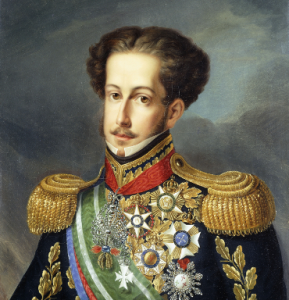The Oliveira Lima Library
Está disponível para a UA, até 30 de abril, a Oliveira Lima Library. O acesso é feito através da GALE CENGAGE Learning e é facultado pela b-on (Biblioteca do
Conhecimento online). Esta Biblioteca digital possui uma das mais raras coleções sobre história e cultura brasileira e portuguesa e está disponível apenas na Universidade Católica dos Estados Unidos (EUA), em Washington.
A biblioteca digital Oliveira Lima Library abrange temas como o colonialismo, o período de independência do Brasil, escravatura e abolição, igreja católica, povos indígenas, imigração, ecologia, agricultura, desenvolvimento económico, medicina e saúde pública, relações internacionais e literatura brasileira e portuguesa. Nas coleções estão disponíveis em formato digital panfletos, livros, manuscritos, quadros, desenhos, material cartográfico, etc.
Na coleção respeitante a Portugal pode encontrar materiais raros sobre o império português em África e na Ásia, cartografia e geografia, literatura entre os séculos 16 a 20, crónicas do reino, história diplomática entre 1500 e 1930, ordens religiosas, o Marquês de Pombal, uma coleção de documentos escritos por António Vieira, Francisco Manuel de Melo, José Agostinho de Macedo, Camilo Castelo Branco, Eça de Queirós e outros.
O acesso está limitado à UA e restantes membros b-on e é feito através do link http://infotrac.galegroup.com/itweb/bontr?db=BPHC&id=tr3a1.
Permite gravar os documentos e exportar as referência bibliográficas para o Mendeley.
Sobre Manoel de Oliveira Lima
“Manoel de Oliveira Lima was born in Recife in 1867. His mother was from Recife and his father was from the Portuguese city of Porto. In 1873 the family moved to Lisbon. Oliveira Lima graduated from the Curso Superior de Letras (today part of the University of Lisbon) in 1888 with a degree in classical and modern literatures. His prolific literary career began at the age of 14, when he established the Correio do Brazil, a monthly journal published in Lisbon. Oliveira Lima wrote more than 20 books, including Dom João VI no Brazil (1908), Formation historique de la nationalité brésilienne (1911), and The Evolution of Brazil Compared with That of Spanish and Anglo-Saxon America (1914). He collaborated with a wide range of Portuguese and Brazilian writers and was a member of the Brazilian Academy of Letters, the Brazilian Historical and Geographical Institute, and many other learned societies.
Oliveira Lima held diplomatic posts in Lisbon, Berlin, Washington, London,Tokyo, Caracas, Brussels and Stockholm, and lectured on Brazilian history at universities throughout the U.S. and Europe.
The books that Oliveira Lima collected reflect his education, travels and scholarly interests. He developed an early appreciation of the importance of original sources, acquiring works on Portuguese philology and etymology to complement his core collections in the history and literature of the Luso-Brazilian world. His travels gave him the opportunity to strengthen his collection, which he built for his own use and for the use of future generations of scholars.
In 1916 Oliveira Lima announced his decision to donate his library to the Catholic University of America. He and his wife, Flora de Oliveira Lima (née Cavalcanti de Albuquerque), arrived at the university in 1920. The collections, most of which had been stored in Europe during the war, followed soon after. Oliveira Lima served as the library’s curator and, from 1923 until his death in 1928, as professor of international law. After Oliveira Lima’s death the collection continued to grow under the direction of Flora de Oliveira Lima (from 1928 to 1940) and of Manoel Cardozo (from 1940 to 1985).”
(in: http://libraries.cua.edu/oliveiralima/oliveiralima.cfm)
Para esclarecimento de dúvidas e mais informação sobre a Oliveira Lima Library aceda à Universidade Católica da América (EUA) através da página Web http://libraries.cua.edu/oliveiralima/, ou contacte a Biblioteca da UA, através do email sbidm-referencia@ua.pt, ou pelos telefones 22303 ou 22304.
